


The Katholischer Studentenverein Arminia (Catholic Students Society Arminia) is one of Germany's oldest Catholic male student societies.



The Katholischer Studentenverein Arminia (Catholic Students Society Arminia) is one of Germany's oldest Catholic male student societies.
Arminia is a student association founded on 6 November 1863 at the University of Bonn. The name was chosen in reference to Arminius, the chief of the Cherusci who drove the Romans out of Germany and thus became a symbol of the – not yet unified – fatherland in the 19th century. In 1865 Arminia, among four other Catholic corporations, became the founder of the Kartellverband katholischer deutscher Studentenvereine (KV), Germany's second oldest umbrella organisation of Catholic male student societies.
In accordance with the Roman Catholic faith and teachings, Arminia strictly refuses academic fencing. Its members do not wear couleur. Arminia's motto is Treu, frei! (English: Loyal, straightforward!). Arminia's principles are (Latin) religio, scientia and amicitia.
Because of its history and its large number of prominent members, Arminia is one of the most distinguished student corporations. Like all German student corporations Arminia is much smaller than American fraternities usually are; it has approx. 350 members, including "Aktive" (students) and "Alte Herren" (alumni).
A number of members participated in the Widerstand (English: resistance) against Nazi Germany; two of them, Leo Trouet and Benedikt Schmittmann, were arrested and killed.
"Last week Adenauer's college days became a topic of national discussion. Addressing a nostalgic reunion of Alte Herren (old grads) (note: at Arminia's hundredth anniversary celebration), the Chancellor defended Germany's tradition of fraternities, which are widely accused of fostering authoritarianism. Though at 87 Adenauer has seen most if not all of his old fraternity classmates die, he is still a loyal member of Arminia. […] Adenauer is supposed to confine himself to being […] the oldest surviving member of Arminia." (Germany. The Oldest Grad, in: Time Magazine (Atlantic Edition) 82 (1963) No. 4, July 26, 1963, 26–27.)

Konrad Hermann Joseph Adenauer was a German statesman who served as the first chancellor of the Federal Republic of Germany from 1949 to 1963. From 1946 to 1966, he was the first leader of the Christian Democratic Union (CDU), a Christian-democratic party he co-founded, which became the dominant force in the country under his leadership.
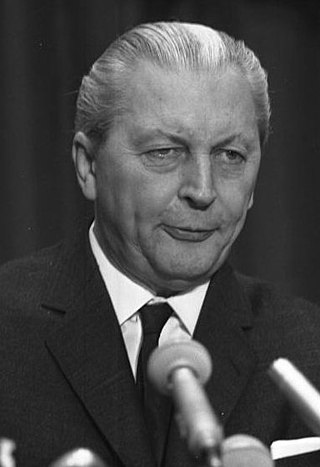
Kurt Georg Kiesinger was a German politician who served as the chancellor of West Germany from 1 December 1966 to 21 October 1969. Before he became Chancellor he served as Minister President of Baden-Württemberg from 1958 to 1966 and as President of the Federal Council from 1962 to 1963. He was Chairman of the Christian Democratic Union from 1967 to 1971.

The Centre Party, officially the German Centre Party and also known in English as the Catholic Centre Party, is a Christian democratic and Catholic political party in Germany. Influential in the German Empire and Weimar Republic, it is the oldest German political party in existence. Formed in 1870, it successfully battled the Kulturkampf waged by Chancellor Otto von Bismarck against the Catholic Church. It soon won a quarter of the seats in the Reichstag, and its middle position on most issues allowed it to play a decisive role in the formation of majorities. The party name Zentrum (Centre) originally came from the fact Catholic representatives would take up the middle section of seats in parliament between social democrats and conservatives.

Studentenverbindung is the umbrella term for many different kinds of fraternity-type associations in German-speaking countries, including Corps, Burschenschaften, Landsmannschaften, Turnerschaften, and Catholic fraternities. Worldwide, there are over 1,600 Studentenverbindungen, about a thousand in Germany, with a total of over 190,000 members. In them, students spend their university years in an organized community, whose members stay connected even after graduation. A goal of this lifelong bond is to create contacts and friendships over many generations and to facilitate networking. The Lebensbund is very important for the longevity of these networks.

Georg Friedrich Karl Freiherr von Hertling, from 1914 Count von Hertling, was a German politician of the Catholic Centre Party. He was foreign minister and minister president of Bavaria, then chancellor of the German Reich and minister president of Prussia from 1 November 1917 to 30 September 1918. He was the first party politician to hold the two offices; all the others were non-partisan.
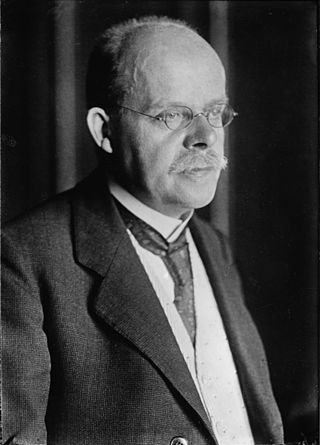
Wilhelm Marx was a German judge, politician and member of the Catholic Centre Party. During the Weimar Republic he was the chancellor of Germany twice, from 1923–1925 and 1926–1928, and served briefly as the minister president of Prussia in 1925. With a total of 3 years and 73 days, he was the longest-serving chancellor during the Weimar Republic.

The Order of the Black Eagle was the highest order of chivalry in the Kingdom of Prussia. The order was founded on 17 January 1701 by Elector Friedrich III of Brandenburg. In his Dutch exile after World War I, deposed Emperor Wilhelm II continued to award the order to his family. He made his second wife, Empress Hermine, a Knight in the Order of the Black Eagle.
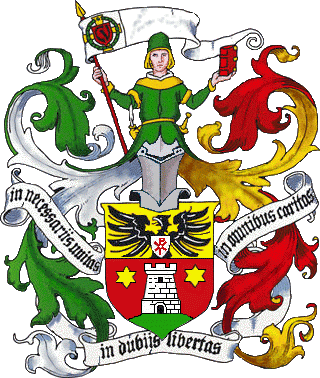
The Union of Catholic German Student Fraternities is a German umbrella organization of Catholic male student fraternities (Studentenverbindung).

Heinrich Krone was a German politician of the Christian Democratic Union (CDU).

Thomas Dehler was a German politician. He was the Federal Republic of Germany's first Minister of Justice (1949–1953) and chairman of Free Democratic Party (1954–1957).

Eugen Karl Albrecht Gerstenmaier was a German Evangelical theologian, resistance fighter in the Third Reich, and a CDU politician. From 1954 to 1969, he served as President of the Bundestag. With a tenure of over 14 years, he is, as yet, the longest serving presiding officer of the German parliament and also the only person to preside over the Bundestag during four legislative periods.
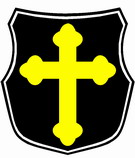
The Roman Catholic fraternity Askania-Burgundia is the founding fraternity of the Kartellverband katholischer deutscher Studentenvereine (KV). It is a Catholic Studentenverbindung. The headquarters of Askania-Burgundia are located in Berlin, Germany. Based on the Roman Catholic faith, Askania-Burgundia strictly refuses academic fencing. Its members do not wear couleur. Askania-Burgundia's principles are religio (religion), scientia (science) and amicitia (friendship).

The House of Bismarck is a German noble family that rose to prominence in the 19th century, largely through the achievements of the statesman Otto von Bismarck. He was granted a hereditary comital title in 1865, the hereditary title of Prince of Bismarck in 1871, and the non-hereditary title of Duke of Lauenburg in 1890. Several of Otto von Bismarck's descendants, notably his elder son Herbert, Prince of Bismarck, were also politicians.
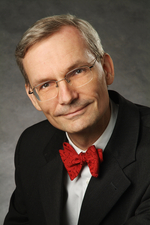
Michael F. Feldkamp is a German historian and journalist.
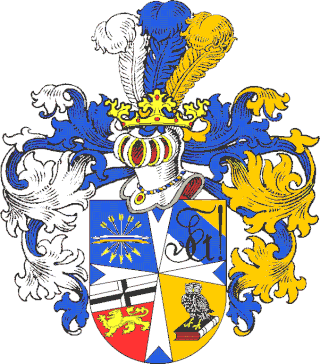
50°44′21.43″N7°6′19.91″E
The Kartellverband katholischer deutscher Studentenvereine is a German academic corporate association with ninety member corporations in Germany, Austria and Switzerland. As of February 2008, the Alliance represents 16,000 students in Germany alone.

The Landtag of Prussia was the representative assembly of the Kingdom of Prussia implemented in 1849, a bicameral legislature consisting of the upper House of Lords (Herrenhaus) and the lower House of Representatives (Abgeordnetenhaus). After World War I and the German Revolution of 1918–19 the Landtag diet continued as the parliament of the Free State of Prussia between 1921 and 1934, when it was abolished by the Nazi regime.

The chancellor of Germany, officially the federal chancellor of the Federal Republic of Germany, is the head of the federal government of Germany and the commander in chief of the German Armed Forces during wartime. The chancellor is the chief executive of the Federal Cabinet and heads the executive branch. The chancellor is elected by the Bundestag on the proposal of the federal president and without debate.

Helene Weber was a German politician and was known as a women's rights activist. In the Weimar Republic she rose to prominence in the Catholic Centre Party. In 1945 she was among the founders of the Christian Democratic Union (CDU). In 1948 she was a co-founder of the CDU Women's Task Force, a precursor of the party's Women's Union, which she chaired from 1951 to 1958. Weber is one of four women who, alongside 61 men, drafted Germany's constitution, the Basic Law, in 1948-49. After initial hesitation, she closed ranks with the women delegates of the Social Democratic Party to successfully fight for the inclusion of the sentence "Men and women shall have equal rights" in Article 3 of the Basic Law. She is often cited for her anti-war statement: "The entirely male-run state is the ruin of nations".

Most German chancellors have been followers of a Christian church. German society has been affected by a Catholic-Protestant divide since the Protestant Reformation, and the same effect is visible in this list of German chancellors. It is largely dominated by Catholics and Protestants as these remain the main confessions in the country.